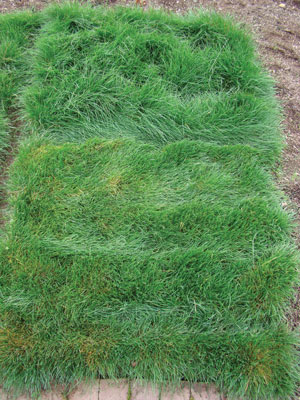
Municipalities with limited budgets for landscape maintenance seek plants that require reduced inputs, including irrigation, mowing or pruning, fertilization, and pest management. Our objective was to identify ground covers that can compete with weeds and maintain aesthetic qualities with minimal maintenance.
In May 2015, we initiated a field experiment in Corvallis, Ore., to evaluate the performance of 10 putative low-maintenance ground cover species with or without mowing. A municipal landscape manager stakeholder group provided input regarding selection of plant species for the study, which included three turfgrasses: Puritan colonial bentgrass (Agrostis capillaris L.), Chantilly Chewings fescue (Festuca rubra L. ssp. commutata), and Longfellow 3 creeping red fescue (Festuca rubra L. ssp. rubra).
Seven forb + shrub species were also in the study: Sedum spurium M. Bieb Tri-color, Euonymus fortunei (Turcz.) Hand.-Maz. Kewensis, Juniperus horizontalis Moench Blue Chip, Herniaria glabra L., Vinca minor L. Bowles, Cotoneaster dammeri C.K. Schneid, and Ceanothus gloriosus J.T. Howell Point Reyes.
Plants were mowed monthly at 4 inches (10 cm) or not at all. Plant material was bagged and removed. Plots were not irrigated or fertilized after establishment, and were weeded annually. Response variables included percent cover (0% to 100%) of desired plant, weeds and bare soil.
Species with the highest percent plant cover were: A. capillaris (85.1%), F. rubra Chantilly (68.1%) and F. rubra Longfellow 3 (66%), followed by S. spurium (24%). Mowing did not affect percent cover. Over two years, the turfgrasses covered significantly more area (73.1%) than the forbs + shrub taxa (9.4%), and they also had fewer weeds than other taxa types (22.9% vs. 82%).
Results suggest that turf is the most cost-effective, low-maintenance ground cover for municipal landscapes.
— Micah A. Gould; Alexander R. Kowalewski, Ph.D.; John Lambrinos, Ph.D.; and Tim Stock, Oregon State University, Corvallis
Editor’s note: An earlier version of this summary was published in the 2016 ASA-CSSA-SSSA Meeting Abstracts, ASA, CSSA and SSSA, Madison, Wis.
Teresa Carson is GCM’s science editor.